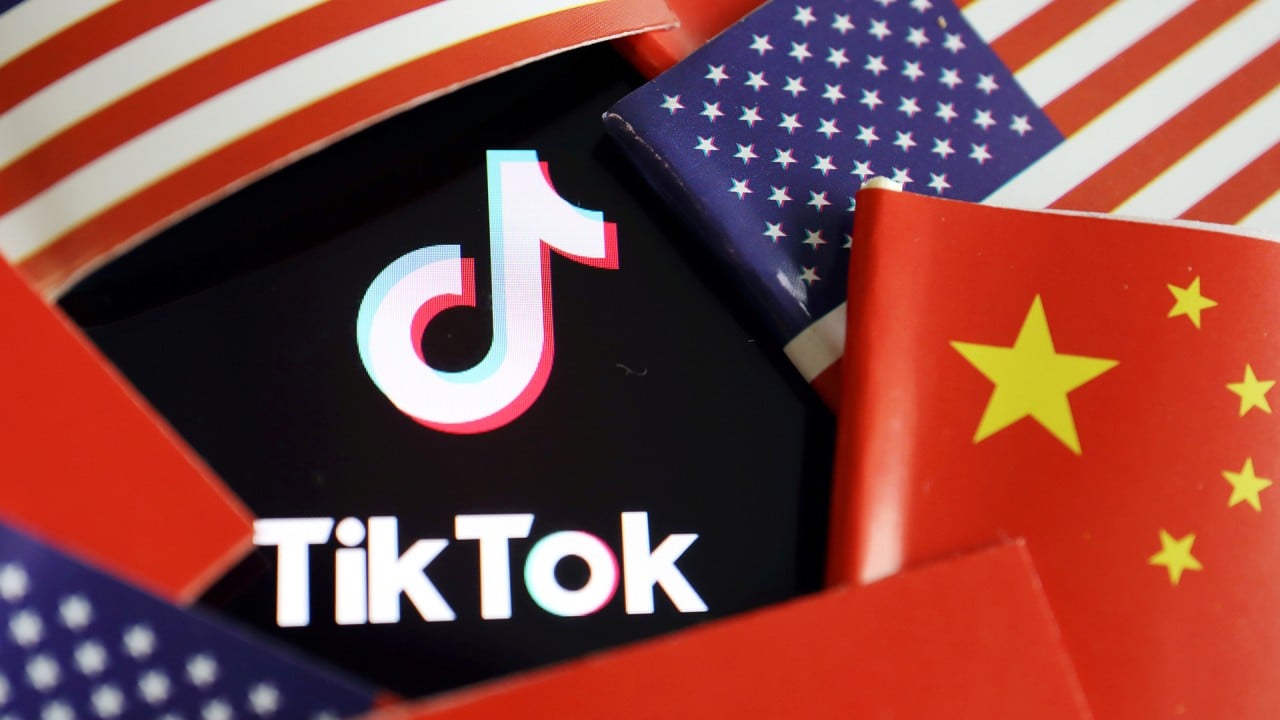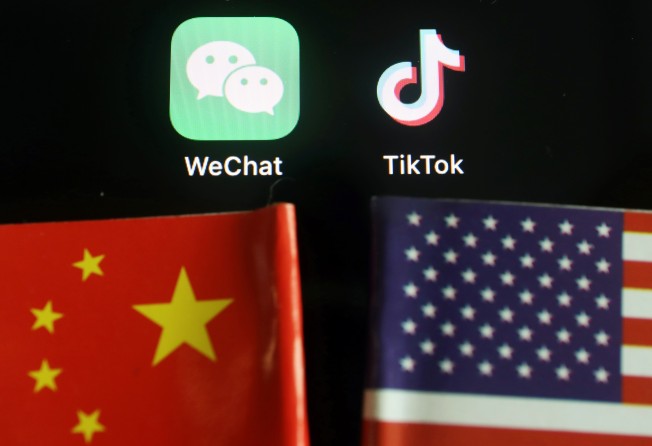
06:35
US demands for TikTok may escalate decoupling and hurt businesses, says China expert

First it was Huawei and TikTok. Now the Chinese triumvirate known as BAT – Baidu, Alibaba and Tencent – is being pulled into the decoupling drama playing out in Washington amid the escalating tech war between the world’s two largest economies.
When asked at a news conference on Saturday whether the administration was looking at banning any other China-owned companies in the US – with the reporter’s question specifically mentioning Alibaba and Baidu – Trump replied, “We’re looking at other things. Yes, we are.”
Although Trump’s response was ambiguous, not indicating whether his “yes, we are” referred to the two Chinese tech giants, it signaled that the backlash may be snowballing beyond TikTok and Tencent.
(Alibaba Group Holding is the owner of the South China Morning Post).
Tencent, the owner of super app WeChat, and TikTok owner ByteDance have already been hit with US sanctions. Two executive orders issued by Trump on August 6 stated that “any transaction” related to ByteDance or WeChat would be banned after a 45 day grace period.
The definition of “transaction” in the order is still pending clarification by the US Secretary of Commerce.
ByteDance was subject to a second executive order over the weekend that said it must divest TikTok within 90 days due to national security concerns.
“Rather than softening the US Government’s position, the [new TikTok] order clarifies that the parties must demonstrate complete divestment, as well as destruction of all US-user application data,” said Nathaniel Rushforth, a US-qualified lawyer and cybersecurity specialist at Shanghai-based DaWo Law Firm.
On Monday, Chinese Ministry for Foreign Affairs spokesman Zhao Lijian said the latest TikTok executive order was “just an excuse for certain US politicians to pursue ‘digital gunboat policy’”.
The US market is a blip on the balance sheets of the Chinese tech giants, contributing less than 2 per cent of Tencent’s global revenue, while Alibaba’s entire international commerce revenue was just 7 per cent of its total. Similarly, China generates nearly 90 per cent of the in-app revenue of TikTok and its Chinese version Douyin, according to analytics firm Sensor Tower.
But while the US does not contribute much to finances, it is important in other ways. In the case of Huawei Technologies, China’s telecoms champion, the Trump Administration has used access to US core tech as leverage to limit the Chinese firm’s growth prospects.
Huawei was put on Washington’s Entity List in May 2019, restricting its access to US technologies like software and semiconductors. As with the TikTok and WeChat executive orders, the Trump Administration cited national security risks to justify its decision.
That has fuelled speculation about similar orders being slapped on BAT.
“The social media and e-commerce platform companies in China are … highly dependent on US technology for their physical infrastructure. So you have a similar vulnerability to Huawei,” said Alex Capri, a Singapore-based research fellow at the Hinrich Foundation. “[The US] is a very small part of their market … but there could be a lot of damage done to their market in China if this technology is withheld.”
Baidu, Alibaba and Tencent declined to comment for this story.
The latest Trump move towards a tech decoupling between the US and China will also present a difficult choice for Europe, India, Southeast Asia, Africa and Latin America, according to analysts.
“This becomes especially challenging if countries are forced to make a decision to exclusively align themselves in terms of technology with either China or the US,” said Ben Wootliff, a partner at consultancy Control Risk. “We’re not there yet, but the Trump administration may be pushing for that.”

06:35
US demands for TikTok may escalate decoupling and hurt businesses, says China expert
Separately, US-listed Chinese companies, including Baidu and Alibaba, could be forced to delist by January 2022 if they do not comply with a series of new rules recommended by a group of influential US regulators.
“The US market is very important for Chinese companies because the corporate governance issues that are going to be facing Chinese companies all over the world are going to be in large part defined by the US values and European values,” said Capri.
Alibaba founder Jack Ma began a global expansion in 2015 and in January 2017 promised to create 1 million new small business jobs in the US after a meeting with then President-elect Trump. However, Ma later backed away from his promise after Trump slapped tariffs on Chinese imports, triggering a trade war.
“The promise was made based on friendly China-US collaboration and rational trade relations,” Ma told Xinhua News. “The current situation has damaged the premise, so we cannot fulfil the promise.”
But this does not mean Alibaba has given up on its push for business outside China. Last year it introduced its global wholesale platform Alibaba.com to US companies, allowing them to sell products and services to other American and global businesses and wholesalers.

Alibaba is also a channel for US companies to do business in China, reaching the country’s massive consumer base. Many US brands, including Microsoft and Tesla, sell their products on Alibaba’s Tmall platforms.
Tencent’s WeChat, known as Weixin in China, has become the primary social messaging platform for Chinese at home and abroad. The Trump ban on WeChat transactions could be a blow to millions of overseas Chinese who use the app to stay in touch with friends and family, and for businesses that use it for communications between China and the US.
WeChat recorded 764,000 installs in the US in the first half of 2020, a little more than 2 per cent of its 32 million downloads globally, according to Sensor Tower.
To address the geopolitical tensions, Tencent chairman and chief executive Pony Ma said on the company’s earnings call last week that “Weixin and WeChat were two different products”, serving users in mainland China and overseas. However, he did not address the fact that users of each one can connect and chat.
Tencent's bigger presence in the US is gaming. According to an estimate by Bloomberg Intelligence, Tencent's gaming business could see a US$22 billion hit if it is targeted for sanctions. Tencent has investments in Epic Games, maker of world's top-selling Fortnite, and Riot Games, developer of League of Legends, the No. 4 bestselling title globally in 2019.
Baidu, which operates an autonomous driving lab in Silicon Valley, does not provide a geographic breakdown of its revenue in its financial statement. “I don't think right now the geopolitical tension has a meaningful impact on our business,” Herman Yu, Baidu's chief financial officer, said on its earnings call last week.
Regardless of which Chinese companies are next on Trump’s target list, tech decoupling between the US and China may result in an irreversible shift in the global internet.
“If in 10 years time we say ‘the global internet is dead’, we will look back and see this as a turning point,” said Wootliff.
Additional reporting by Jane Zhang and Celia Chen